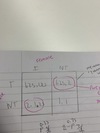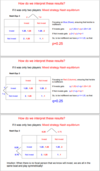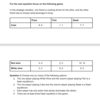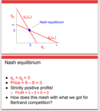Week 6 Flashcards
So far what are the 2 abstractions we have looked at?
1st abstraction: Perfectly competitive market
2nd Abstraction : Monopoly
These two are 2 opposite extreme cases on the spectrum.
Within the first abstraction of Perfectly competitive market, what does it include?
Each firm acts in isolation, No strategic interaction they are price takers, they don’t internalise the fact that there actions in the market do affect price, even in a small way.
Within the 2nd abstraction, monopoly what can we deduce from it?
There is no strategic interaction, it does internalise the fact that it its actions affect price, but as monopolist is the only firm in the market, they do not engage in strategic action with anyone.
What is the 3rd abstraction we are going to look at?
Duolopoly (what is the price the other firm is choosing), oligopoly( what are the other bidders going to do), auctions and kitty genevose( neighbours have to think whether to call or not to call)
So we know that the 3rd abstraction is about strategic interaction, what model will we use?
Game theory, which is a model of strategic interaction, and helps us understand what happens in between perfect competition and monopoly.
Remember in the kitty genevose game, what was the solution concept?
Rationality (Each neighbor has a belief about the behaviour of other neighbours and “best responds” to that belief.)
Beliefs are correct . (All neighbors actually behave inline with the others beliefs about them.)
What is a game ?
1) Set of players
2) Specification of actions for each player
3) Payoffs ( motivates, utiltiy functions)
In the Kitty geneovese case what was the game under the specififications?
1) Sets of players ( 38 players)
2) Specification of actions for each player( call or not call)
3) Payoff ( X , X-1 ,0)
We have 2 solution concepts in game theory which are what?
Strict domiance
Nash equilbrium
What is a Nash equilbrium?
Is a concept within game theory where the optimal outcome of a game isi where there is no incentive to deviate from their inital strategy
Draw a 2 by 2 game of the kitty genevose case?

What is the Nash equilbrium of the kitty geneovese game?
There are 2 where Neighbour calls and Neighbour 2 doesnt call
and when neighbour 1 doesn’t call and Neighbour 2 calls
This is because given that Neighbour one doesn’t call, neighbour 2 can either call or not call but there is no incentive to deviate. In addition given that neighbour 2 calls, there is no incentivate for neighbour 1 to deviate, vice versa for when neighbour 1 calls and neighbour 2 doesn’t.

If there is a Nash equilbria, what must exist?
A mixed strategy equibria
Not all games have a what action?
A strictly dominate action
Lets say you and a student study together for an exam, you either prepare before the meeting or watch great british bake off.
If both prepare you get a payoff of 60
If both you don’t prepare you get a payoff of 40
If one prepares and the others don’t the payoff of one is 35 and the other is 75
Draw the 2 by 2 game?

From this payoff matrix what can we deduce

The action of not preparing strictly dominates the action of preparing as 75>>60 and 40>>35, for both players.
So what does strictly dominate mean?
-a strictly dominant strategy is that strategy that always provides greater utility to a the player, no matter what the other player’s strategy .
Will a rational player ever play a strictly dominate action?
No as they will never pick an option that will give them a worse payoff. Rational players seek to maxmise their payoff from the game. Playing a strictly dominate action will always give them a lower payoff.
As we know not to prepare strictly dominates to prepare what does this also mean?

That not prepare not prepare is a nash equilbrium, so this is what we predict rational players will do

In a nash equilbrium can there be a strictly dominate action?
No as they are not best responding if they pick a strictly dominate action.
What else can you see from this Nash equilbria?

Both of the players would of been better off preparingf as 60,60>40, 40.
What can we say about preparing preparing having a high payoff than the nash equilbria not preparing, not preparing?

Both preparing pareto dominates us not preparing( the nash equilbria), as both of us would be strictly better off preparing.
What is the difference between a perfectly competitive firm who play this game to prepare and not prepare and in a duolopoly type people game?
In a perfectly competitive firm, we put rational people together and somehow they always achieve a pareto efficient allocation, but here they achieve something that is not pareto efficient, this is because of externalities in the game. This will always arise between the two players.
So to conclude how is perfectly competitive firm different to game theory?
Players who are rational within a perfectly compeittive market always get to the efficient outcome but in the real world, this is not true.








































